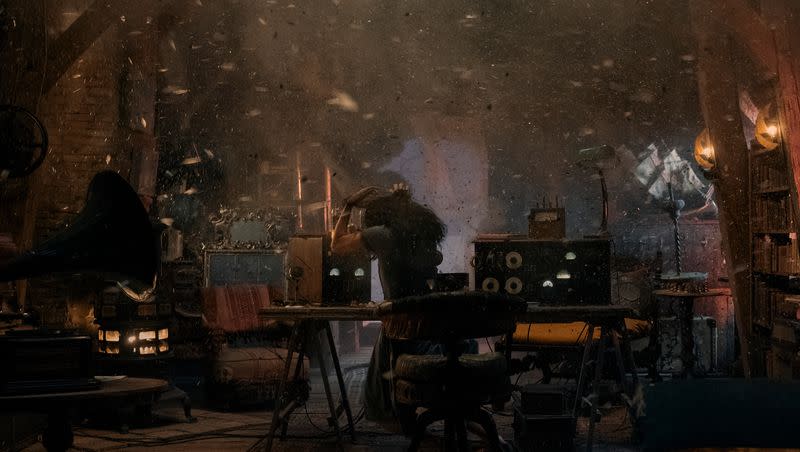‘All the Light We Cannot See’ is panned by most critics, praised by a few

- Oops!Something went wrong.Please try again later.
- Oops!Something went wrong.Please try again later.
Adapting Anthony Doerr’s “All The Light We Cannot See” is a daunting task.
The Pulitzer Prize-winning novel does not have a chronological narrative and condensing the complexity, nuance and sheer volume of content in the book takes an adept hand.
The four-episode Netflix limited series that takes on this task premiered on Thursday. It was directed and produced by Shawn Levy, who told Deadline, “The book is the mountain. The mountain will always exist. Long after us, the mountain will be here. We did a painting of that mountain. We’re not trying to replace it. We’re not trying to make a photograph or a Xerox. It’s our impression of that mountain.”
Now, as the series has premiered, the reviews are in.
Related
‘All the Light We Cannot See’ review
What’s great: Cinematography, use of light, Aria Mia Loberti, production quality, theme of hope in dark times and overall cast.
What could be better: Translating the complexity of the novel to screen.
What parents should know: It’s rated TV-MA for language and violence.
The premise of “All the Light We Cannot See” is that Marie-Laure (Aria Mia Loberti), a blind teenager, flees Nazi occupation in Paris with her father (Mark Ruffalo) to stay with her uncle Etienne (Hugh Laurie). She joins the resistance against the Nazis via radio broadcasting.
In terms of cinematography, “All the Light We Cannot See” excels. There was clear attention to colors with gray, blue, black and hazy yellow tones adding interest to each scene. The contrast between light (sunlight, lamps, etc.) and darkness (typically in the form of shadows) also was a high point of the series’ quality.
Loberti shines in her role as the protagonist of the series, Marie-Laure. Beyond the quality of filming, Loberti is the best part. She’s a dynamic actress who conveys a crucial part of the novel: She can pierce through the static and see things and people as they are.
Her character courageously offers hope to a bevy of people who rely on her radio broadcasting so that they can win the war against the Nazis.
There was a difficulty that arose in adapting the book to the screen: The book’s nuance, complexity and sheer volume of content was not easily replicable.
A reviewer for Time magazine described the series as “morally simplistic.” At times, it was, especially with regards to Werner. In the series, Werner is part of the Nazi party and becomes disillusioned with the party after he learns about other people and cultures via the radio. While the series shows Werner grappling with disillusionment, it doesn’t spend much time showing him wrestling with his own complicity in the evils Nazis perpetuated beyond an admission that he did things that were wrong.
In an age of movies spanning more than three hours, I hesitate to suggest that it should be longer, but I think if the series were a couple episodes longer, there would be more time and space to develop the moral complexities that led to Doerr’s novel winning a Pulitzer.
On a more positive note, the series managed the transitions between flashbacks and the present quite well. The use of sounds in the series also is done well. But ultimately, as someone who loved the book, I was left conflicted about the series. I wanted to like the series and there was a lot about it that I did like, but ultimately, I think the series should have taken morality more seriously, especially with regards to Werner.
Overall take: “All The Light We Cannot See” succeeded in terms of the quality of the series. It’s one of the highest-quality shows that has come out in a long time, but it didn’t end up translating the nuances and complexities with regards to morality that Doerr teases out in his book. So all in all, I enjoyed the series, but had some quibbles.
Other reviews of ‘All the Light We Cannot See’
On Rotten Tomatoes, “All the Light We Cannot See” walked away with a 31% critics score and a 92% audience score. Here are some quotes from the reviews.
David Bianculli for NPR: “Co-creators Shawn Levy and Steven Knight, who directed and wrote this miniseries, didn’t just fill a difficult and demanding part when they cast this impressive unknown. They also discovered a talented new actor.”
Lucy Mangan for The Guardian: “All nuance is lost, all thought has been excised and it feels both drearily slow and stupidly rushed. Maybe this superficial, self-indulgent mess would have come over more favourably if war hadn’t just broken out again in the real world, but them’s the breaks. Though even in the middle of a long unbroken peacetime, this was never going to do more than look good.”
Randy Myers for The Mercury News: “As a storyteller, Doerr is a master at weaving all these threads and elements together while giving us more nuanced characters, but in this well-intentioned production, there is stitching and seams that we can see all too often.”
Cindy White for The AV Club: “When it gives you a chance to catch your breath, ‘All The Light We Cannot See’ can be wonderfully transporting. If only it would let the audience bask in the atmosphere of any of its settings for a while before thrusting us backward or forward in time, it might stick to the ribs a bit more.”

